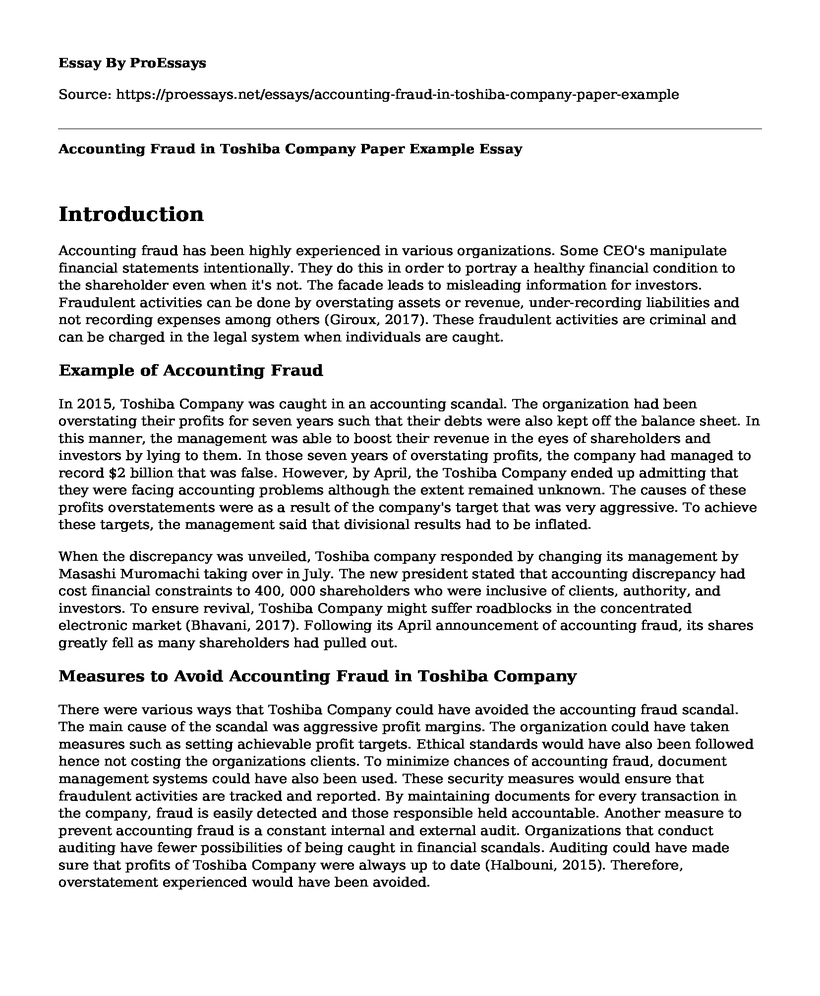Introduction
Accounting fraud has been highly experienced in various organizations. Some CEO's manipulate financial statements intentionally. They do this in order to portray a healthy financial condition to the shareholder even when it's not. The facade leads to misleading information for investors. Fraudulent activities can be done by overstating assets or revenue, under-recording liabilities and not recording expenses among others (Giroux, 2017). These fraudulent activities are criminal and can be charged in the legal system when individuals are caught.
Example of Accounting Fraud
In 2015, Toshiba Company was caught in an accounting scandal. The organization had been overstating their profits for seven years such that their debts were also kept off the balance sheet. In this manner, the management was able to boost their revenue in the eyes of shareholders and investors by lying to them. In those seven years of overstating profits, the company had managed to record $2 billion that was false. However, by April, the Toshiba Company ended up admitting that they were facing accounting problems although the extent remained unknown. The causes of these profits overstatements were as a result of the company's target that was very aggressive. To achieve these targets, the management said that divisional results had to be inflated.
When the discrepancy was unveiled, Toshiba company responded by changing its management by Masashi Muromachi taking over in July. The new president stated that accounting discrepancy had cost financial constraints to 400, 000 shareholders who were inclusive of clients, authority, and investors. To ensure revival, Toshiba Company might suffer roadblocks in the concentrated electronic market (Bhavani, 2017). Following its April announcement of accounting fraud, its shares greatly fell as many shareholders had pulled out.
Measures to Avoid Accounting Fraud in Toshiba Company
There were various ways that Toshiba Company could have avoided the accounting fraud scandal. The main cause of the scandal was aggressive profit margins. The organization could have taken measures such as setting achievable profit targets. Ethical standards would have also been followed hence not costing the organizations clients. To minimize chances of accounting fraud, document management systems could have also been used. These security measures would ensure that fraudulent activities are tracked and reported. By maintaining documents for every transaction in the company, fraud is easily detected and those responsible held accountable. Another measure to prevent accounting fraud is a constant internal and external audit. Organizations that conduct auditing have fewer possibilities of being caught in financial scandals. Auditing could have made sure that profits of Toshiba Company were always up to date (Halbouni, 2015). Therefore, overstatement experienced would have been avoided.
Conclusion
Currently, the economic climate is tempting organizations to falsify their financial statements for several gains. Such situations have led to negative consequences for these companies as they lose their goodwill. Committing accounting fraud has also seen multiple companies pay fines while some CEO's end up serving time in jail. For Toshiba Company, it was their goodwill which was lost as clients and investors pulled out. Even with various attempts to reinstate their reputation, this company has a long way to go.
References
Bhavani, G., & Amponsah, C. T. (2017). M-Score and Z-score for detection of accounting fraud. Accountancy Business and the Public Interest, 68-86.Retrieved from http://visar.csustan.edu/aaba/BhavaniAmponsah2017.pdf
Giroux, G. (2017). Accounting Fraud: Maneuvering and Manipulation, Past and Present. Business Expert Press. Retrieved from http://visar.csustan.edu/aaba/BhavaniAmponsah2017.pdf
Halbouni, S. S. (2015). The Role of Auditors in Preventing, Detecting, and Reporting Fraud: The Case of the United Arab Emirates (UAE). International Journal of Auditing, 19(2), 117-130.Retrieved from https://onlinelibrary.wiley.com/doi/abs/10.1111/ijau.12040
Cite this page
Accounting Fraud in Toshiba Company Paper Example. (2022, Nov 20). Retrieved from https://proessays.net/essays/accounting-fraud-in-toshiba-company-paper-example
If you are the original author of this essay and no longer wish to have it published on the ProEssays website, please click below to request its removal:
- Paper Example on Perceived Value: Crucial for Sustaining Restaurants in Fierce Competition
- Paper Example on Environmental Management for Sustainable Business Practices
- Health Care in Prisons: A Human Right or Luxury? - Essay Sample
- Types of Investment: Exploring Different Methods - Research Paper
- Research Paper on Juvenile Justice: Punishment vs. Treatment
- Essay Example on Misconduct in Employment: Section 593 of Labor Law Explained
- Ethics: The Key to a Successful Business - Lockheed Corporation Example - Essay Sample







